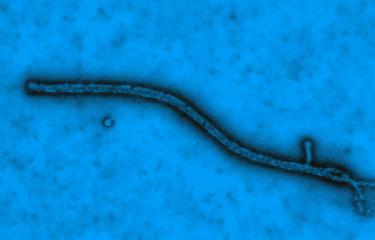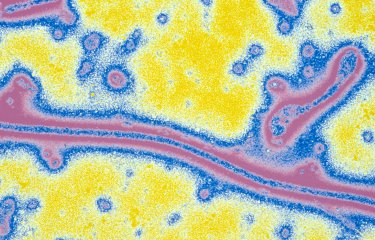Ever since the Ebola virus was identified in Guinea in March 2014, the designated WHO Collaborating Centers within the Institut Pasteur and Institut Pasteur International Network have been assisting the international aid initiative via diagnostic support and epidemiological surveillance. Now, faced with the seriousness and spread of the epidemic, the Institut Pasteur and Institut Pasteur International Network are strengthening and coordinating their efforts in order to effectively fight the disease.
Press release
Paris, September 1, 2014

The Institut Pasteur behind the identification of the Ebola virus in Guinea
Scientists at the National Reference Center and the Laboratory for Urgent Response to Biological Threats (CIBU - Institut Pasteur, Paris) became involved in molecular diagnostics in Guinea as soon as the country was confirmed as the origin of the epidemic by the National Reference Center for Viral Hemorrhagic Fevers (Institut Pasteur, Lyon).
The Institut Pasteur was one of the first international laboratories working in Guinea to provide diagnostic facilities and put in place dedicated training programs locally for laboratory personnel. It is now strengthening its involvement with the scheduled delivery of a high-containment mobile laboratory to West Africa, in partnership with Inserm and the Mérieux Foundation, using European funding.
The Institut Pasteur International Network working on the frontline of the epidemic
In parallel with this, in March 2014 WHO and the Guinean government asked the Institut Pasteur in Dakar to lend its support to the investigation into the epidemic. The Institut Pasteur in Dakar was the first African organization to set up a laboratory in Guinea and to confirm suspected cases. It has tested 480 samples and confirmed 113 cases in Guinea. It has also analyzed samples of suspected cases from Angola, Gambia, Mali and Senegal. The teams from the Institut Pasteur and the Institut Pasteur in Dakar have also trained a team of Guinean technicians in diagnosing the Ebola virus and in methods of taking samples from patients.
In addition, in order to ensure continuation of the initiative instigated in Guinea an Institut Pasteur research center is soon to be created in Conakry.
Creation of a task force to put the Institut Pasteur at the forefront of research
With the spread of this epidemic becoming a major health concern, Christian Bréchot, Institut Pasteur president, has decided to implement a task force. The aims of this working group are as follows:
- To update all potentially useful resources and expertise,
- Using a cross-disciplinary approach, to identify key short- and medium-term research strategies that will focus on the design of diagnostic tests and the development of new therapies and preventive initiatives to combat the epidemic,
- To coordinate actions and interventions in the field, and
- To raise awareness of the strategic, economic and political agenda.
This working group will base itself on the coordinated actions of the following entities:
- The IBEID laboratory of excellence, headed up by Philippe Sansonetti and Pascale Cossart,
- Institut Pasteur International Network member institutes,
- The Research Units and CIBU in Paris and Lyon, which are directly involved in this research,
- The Institut Pasteur's research departments,
- Recently created research centers,
- Recently implemented research incentive programs, such as the vaccinology program, and
- The Institut Pasteur International Division.
A special session is to be conducted to provide information on this task force during the next International Network symposium, from September 10 to 13, at the Institut Pasteur in Paris.
A press briefing will be organized during this session focusing on creation of the Ebola task force.





